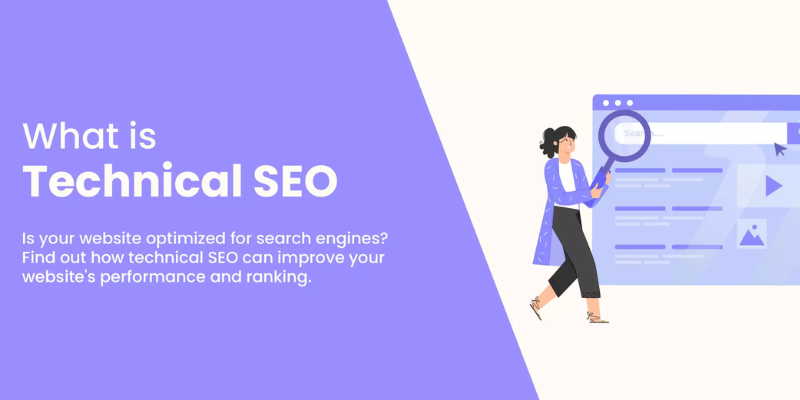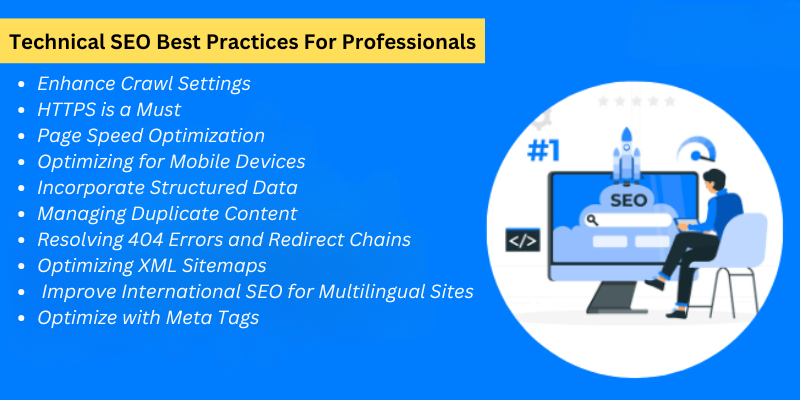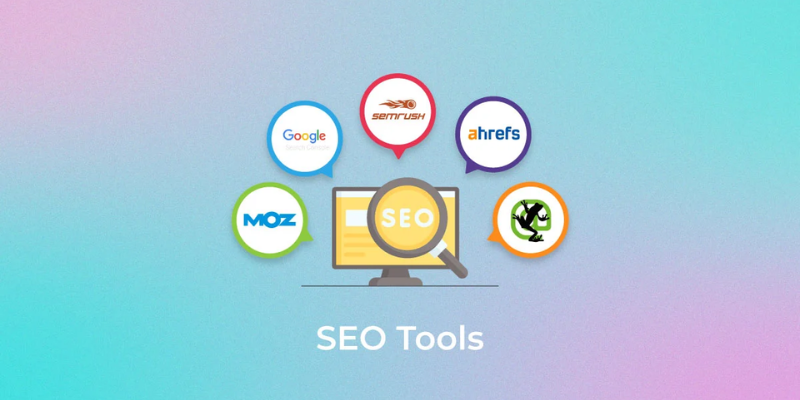By 2024, SEO has become a familiar concept for anyone in the world of online business and marketing. However, not many of us are well-versed in the concept of “Technical SEO.” Take your website to new heights with Technical SEO! Discover essential techniques and a comprehensive checklist to maximize the effectiveness of your website!
Technical SEO is crucial for startups looking to establish a strong online presence. Websites frequently encounter challenges such as slow loading speeds and inadequate mobile optimization. Ensure that your site’s visibility and user satisfaction remain unaffected by addressing these underlying issues.
Also Read: Mastering Link Building: A Comprehensive Guide To Boost Your Seo Strategy
It’s fascinating to note that a significant 78% of online experiences commence with a search engine according to a survey. A strong SEO strategy is essential for transforming those searches into valuable opportunities for business success. It is the linchpin that can make all the difference.
Explore our detailed Technical SEO for Startups tutorial. Our top digital marketing company in jaipur will help you improve your online presence with experienced advice and techniques. Are you ready to boost your new website’s digital success? Improve user experience, raise organic traffic, and reach your goals professionally. Turn those chances into wins!
What Is Technical SEO?
Technical SEO involves making changes to your website’s code and structure so that it works well when search engines crawl and index it. Our primary objective is to enhance the technical aspects of a website to effectively elevate its organic rankings. Important factors such as site speed, mobile-friendliness, architecture, security, and the increasingly emphasized Core Web Vitals are essential in the process of optimizing your website.

Implementing technical SEO is essential for optimizing your website’s visibility and ensuring it is user-friendly and easy to navigate. User experience and readability can boost search rankings. By prioritizing user experience and readability, you can significantly enhance your search rankings.
Understanding Technical SEO’s Importance For Every Firm
Technical SEO is important for every business to be seen online and be successful, no matter what industry, size, or digital realm it is in. Tech SEO helps e-commerce platforms and informational websites succeed, whether they’re little startups or global corporations.
Technical SEO optimizes website technicalities to boost search engine rankings. Make sure search engine crawlers can crawl and index website material. Additionally, site performance, mobile-friendliness, and technological concerns that may hinder search engine exposure must be addressed. While content and backlinks are key components of SEO, disregarding the technical parts can drastically impair the efficiency of any SEO plan. Uncover the immense potential of technical SEO in propelling your online achievements. Let’s see how technical seo drives online success:
- Search Ranking Impact: Technical SEO is important because it directly affects search engine rankings. Search engines like Google are always updating their algorithms to ensure they deliver the most relevant and user-friendly results to their users. Web page ranking algorithms consider many technological variables. Optimizing a website boosts SERP rankings, which increases organic traffic and potential consumers.
- Enhancing User Experience: Technical SEO improves website UX as well. In today’s fast-changing digital world, websites must load quickly and smoothly on all devices. Poorly optimized websites might put people off and drive them away. Missed opportunities to engage with potential consumers and convert them into loyal users might hurt your business. Businesses may design a professional website that engages visitors and encourages them to explore by using advanced strategies to improve site speed, mobile responsiveness, and structured data markup.
- Do Better Than Your Rivals: Today’s competitive online market requires a well-rounded SEO approach that focuses technical optimization. It will keep you ahead of the competition and boost your internet presence. Businesses of all sizes compete for search engine rankings to attract clients. A well-designed website that is technically sound and optimized for search engines has a higher possibility of overcoming competition and generating lucrative organic visitors.
- Stay Trendy: Technical SEO is important for traditional websites, e-commerce platforms, mobile apps, and voice search. Technical SEO strategies like schema markup and natural language processing are important for voice search optimization. Professionally using voice-activated gadgets and smart assistants requires certain skills.
Also Read: Comprehensive SEO Audit Strategies for 2024: Boost Your Website’s Performance
Technical SEO Elements
Now that we have a solid grasp of the fundamentals of technical SEO, let’s explore the essential components that make up a successful technical SEO strategy.
- Website Crawling: Website crawling is an essential step in which search engines explore your website. During this process, search engine robots, also known as “spiders,” navigate through your site’s pages and posts. It is important to make your website easily crawlable to improve indexing and achieve higher rankings on search engine results pages.
- Indexing: Indexing is the next step after the crawling process is finished. It involves storing and organizing the crawled data in a manner that facilitates effortless searching. Having a well-structured website greatly improves the likelihood of all pages being indexed accurately.
- Page Speed: Improving the speed of your website is crucial for enhancing user experience and optimizing search engine performance. To achieve this, it is important to compress images, minify CSS and JavaScript, and make use of browser caching. By implementing these techniques, you can ensure that your website performs like a professional and increases its chances of ranking higher.
- Mobile-Friendliness: In today’s digital landscape, the significance of having a mobile-friendly website cannot be overstated. Given the current trend of mobile traffic surpassing desktop, it is imperative to prioritize the optimization of your website for mobile devices. Not only does this cater to the preferences of your users, but it also plays a role in improving your Google ranking. By adopting a responsive design that seamlessly adjusts to any screen size, you can greatly enhance the mobile user experience.
- XML Sitemap: An XML sitemap is a valuable tool for search engines, helping them navigate through your website and find all the important pages. By using XML sitemaps, you can enhance your SEO strategy and make it easier for Google to discover your essential website pages.
- Website Security: Ensuring the security of your website is crucial for both user data protection and building trust. One way to achieve this is by implementing HTTPS, which is a known Google ranking factor. By using HTTPS, you can keep user data secure and enhance the credibility of your website.
Also Read: Boost Your Startup’s Growth with Effective SEO: Comprehensive Guide and Practical Tips
Technical SEO Best Practices For Professionals
Like fine-tuning your vehicle’s engine, technical SEO makes sure that a site’s core functions work well so that it ranks well in search engines. Technical SEO is the most important thing for SEO pros to pay attention to if they want their websites to work at their best. Here are some essential tips that any SEO specialist should know:

1. Enhance Crawl Settings
- Robots.txt File: To control which pages search engines can access, you need to make sure that your robots.txt file is well-organized. Check to see if you are hiding any important pages by accident.
- Crawl Budget: A site’s crawl budget refers to the number of pages that search engines will examine within a specific timeframe. By optimizing this, you can ensure that vital pages are not overlooked.
2. HTTPS is a Must
Securing your website with SSL is essential to ensure the safety of your users’ information. By transitioning from HTTP to HTTPS, you not only provide an extra layer of security, but you also improve your website’s ranking on search engines like Google.
3. Page Speed Optimization
- Optimize Image Compression: Enhancing the loading speed of your web pages requires efficient handling of image files. Utilize tools such as TinyPNG or Compressor.io to compress large image files effectively.
- Enhance Server Response Time: To ensure a smooth user experience, it is crucial to invest in reliable hosting services and explore the option of utilizing a Content Delivery Network (CDN) to minimize latency.
4. Optimizing for Mobile Devices
Given the large number of users accessing websites through mobile devices, it is essential to have a design that is optimized for mobile and responsive. Google’s Mobile-Friendly Test provides valuable insights into the level of mobile optimization on your website.
5. Incorporate Structured Data
Utilizing schema markup enhances the comprehension of your content by search engines. By implementing this strategy, you can achieve rich snippets in search engine results pages, which have the potential to boost click-through rates.
6. Managing Duplicate Content
Having multiple pages with the same content can diminish the effectiveness of your content in the eyes of search engines. To address this, it is important to use canonical tags to indicate to search engines which version of a page should be considered as the primary one.
7. Resolving 404 Errors and Redirect Chains
- 404 Errors: These errors can be problematic for both search engines and users. It is important to identify each broken page and either redirect it to a relevant page or remove any links that lead to it.
- Redirect Chains: When there are multiple redirects in a sequence, it can slow down page loading and cause confusion for search crawlers. It is advisable to simplify these redirects and opt for direct redirects whenever feasible.
8. Optimizing XML Sitemaps
Make sure to regularly update your XML sitemap to include all important pages of your website. Submit the sitemap to search engines using tools such as Google Search Console to enhance search engine indexing.
9. Improve International SEO for Multilingual Sites
To optimize your website for multiple regions or languages, make use of hreflang tags. These tags play a crucial role in informing search engines about the language and geographic targeting of each page, ensuring that the right audience is directed to the appropriate content version.
10. Optimize with Meta Tags
To present your website in the best possible light, it is essential to include meta descriptions and meta title tags on each page. These tags provide Google and other search engines with valuable context about the content of each page. For optimum impact, include the page’s target keyword in the title tag and meta description.
Also Read: Top Most SEO Strategies for Car Washes Businesses to Attract More Clients
Understanding Core Web Vitals And Technical SEO
Core Web Vitals have become increasingly important in Technical SEO due to Google’s recognition of them as key metrics for assessing a website’s user experience. These vitals are a subset of factors that contribute to Google’s page experience score, which aims to provide measurable insights into users’ web page experiences. Now, let’s explore their relationship with Technical SEO in more detail.
Here are the three metrics that comprise Core Web Vitals:
- Largest Contentful Paint (LCP) is a metric that evaluates the loading performance of a webpage. It provides valuable insights into how quickly a page loads and helps identify areas for improvement. An excellent LCP score signifies that the main content of the page loads swiftly, ideally within 2.5 seconds of arriving on the page.
- FID measures the level of interactivity. The evaluation focuses on the speed at which a page becomes interactive, aiming for an ideal time of less than 100 milliseconds.
- The Cumulative Layout Shift (CLS) metric evaluates the visual stability of a webpage. This metric focuses on unexpected layout shifts that can be bothersome for users. An ideal CLS score should be below 0.1.
Understanding The Connection Between Core Web Vitals And Technical SEO
Technical SEO involves optimizing the structure and infrastructure of a website to make it easily accessible, and searchable, and provide a seamless user experience. Core Web Vitals align perfectly with these objectives, prioritising metrics that gauge user experience.
- Website Performance: Improving website performance involves implementing technical SEO practices that focus on optimising images, leveraging browser caching, and minimizing code. These practices directly contribute to faster content loading, which can positively impact LCP scores.
- Optimising JavaScript: By properly optimising and deferring non-essential JavaScript, you can greatly improve FID scores. This allows the browser to quickly respond to user interactions without being slowed down by unnecessary scripts.
- Consistent Design Elements: By implementing fixed dimensions for design elements and employing strategies such as “lazy loading,” you can avoid sudden layout shifts and improve your Cumulative Layout Shift (CLS) scores.
Also Read: Accelerate Your Startup’s Success: Crucial SEO Strategies and Mistakes to Avoid
Useful Technical SEO Tools
Utilising appropriate technical SEO tools can assist in optimising your website. Several vital technical SEO tools can simplify the process of optimization:

- Google Search Console: The Google Search Console tool, which is free of charge, offers significant insights into the search results of your website. It monitors indexing, search queries, CTRs, and more. Google Search Console also reports crawling failures, mobile usability issues, and security risks that may affect search rankings.
- PageSpeed Insights: Site speed impacts SEO and UX. Performance improvements are recommended by Google PageSpeed Insights for desktop and mobile pages. FCP and LCP are used to find optimisation opportunities.
- SEMrush: The multifunctional SEO tool SEMrush conducts an analysis of technical SEO. Broken links, duplicate content, and missing meta tags may be found by crawling your website. For website optimization, SEMrush offers competitive analysis, keyword research, and backlink analysis.
- Moz Pro: Moz Pro also offers tools for conducting technical SEO audits. This tool is designed to identify and detect crawl issues, duplicate content, and missing meta tags on websites. Moz Pro’s comprehensive suite of tools, including keyword research, rank tracking, and backlink analysis, enhances website rankings.
- Screaming Frog SEO Spider: The Screaming Frog SEO Spider is a widely-used desktop program for conducting technical SEO audits. It crawls your website and gives technical details like broken links, duplicate content, missing meta tags, and server errors. Larger websites with complicated structures and lots of content benefit from Screaming Frog SEO Spider.
- Ahrefs: Ahrefs is a robust SEO tool that offers tools for technical SEO analysis, including site auditing. It can crawl your website to find technical faults such as broken links, redirect chains, and HTTP status code errors. To boost your website’s SEO, Ahrefs offers backlink analysis, keyword research, and competitive analysis.
- GTMetrix: When it comes to judging how well a page is doing, GTMetrix is a tool that gives very accurate results. The Page Speed Insights tool offered by Google is not as detailed as the analysis that this tool offers. The precise problems that are responsible for sluggish page speed can be identified by GTMetrix. These problems can be found inside page requests, JavaScript, and CSS files (CSS files).
These are just a few examples of the various technical SEO tools available to assist you optimize your website efficiently. You may use one or more of these tools to ensure your website is technically sound and search engine-optimized, depending on your needs and budget.
Also Read: How to Take Your Business Online for Free: A Step-by-Step Guide
Conclusion: Rise Your Website’s Efficiency With Technical SEO
A website’s ability to succeed in the digital sphere is greatly influenced by its technical SEO. By following the nine best practices provided, you will establish a solid foundation for search engine visibility and improve the overall user experience. In the realm of SEO, having a strong technical foundation can greatly enhance your other endeavours, such as creating content and building links.
If you want to enhance your website’s technical foundation and stay ahead in the digital competition, don’t try to tackle these challenges by yourself. Contact G2STechnology for top-notch best seo services in jaipur. Our team is committed to offering knowledgeable support and guidance to ensure the success of your website. Get in touch with us now!
Quick Contact Us :
Email: info@g2stechnology.com
Call/WhatsApp: +91-7976373846
Visit: https://g2stechnology.com


